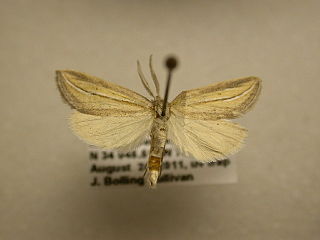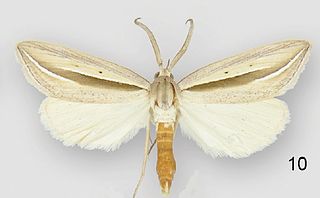
Doryodes is a genus of moths in the family Erebidae.

Doryodes bistrialis, the double-lined doryodes moth, is a moth of the family Erebidae. The species was first described by Carl Geyer in 1832. It is found in the eastern United States, including Delaware, Virginia, Mississippi and Florida. Its habitat consists of wet pine flatwoods and pine savannas.

Amyna axis, the oriental eight-spot, is a moth of the family Noctuidae. The species was first described by Achille Guenée in 1852.

Drasteria parallela is a moth in the family Erebidae. It is found in the Cascade Mountains of Washington, the Klamath and Siskiyou Mountains of south-western Oregon and the northern Sierra Nevada in California. The habitat consists of exposed ridges in forests at middle elevations.
Apantesis bowmani is a moth of the family Erebidae. It was described by Douglas C. Ferguson and B. Christian Schmidt in 2007. It is found in the United States in western Colorado and southeastern Utah. It occurs at elevations between 1,520 and 2,130 meters.
Apantesis f-pallida is a moth of the family Erebidae. It was described by Strecker in 1878. It is found from south-eastern Utah and Colorado south to eastern Arizona, New Mexico and eastern Texas. It has also been recorded from west-central Nevada, and probably also occurs in Mexico.
Apantesis margo is a moth of the family Erebidae. It was described by Schmidt in 2009. It is found in grassland and transitional habitats on the northern Great Plains and Southern Rocky Mountain Front ranges, south to east-central Arizona.
Apantesis ursina is a moth of the family Erebidae. It was described by Schmidt in 2009. It is found on the Channel Islands off the coast of southern California and in mainland south-western California from Kern County south to San Diego County. It is probably also present in Baja California.
Chelis sordida is a moth of the family Erebidae. It was described by James Halliday McDunnough in 1921. It is found in the mountains of Alberta and British Columbia and possibly Yukon and Alaska. The habitat consists of dry rocky alpine tundra.

Protorthodes texicana is a moth in the family Noctuidae first described by J. Donald Lafontaine in 2014. It is known from west-central Texas and southern Mexico.

Protorthodes mexicana is a moth in the family Noctuidae first described by J. Donald Lafontaine in 2014. It is found in Xalapa, Mexico.

Nudorthodes molino is a moth in the family Noctuidae first described by J. Donald Lafontaine, J. Bruce Walsh and Clifford D. Ferris in 2014. It is found in the western US in southeastern Arizona and southwestern New Mexico.

Doryodes insularia is a moth of the family Erebidae first described by George Hampson in 1904. It is found on the Bahamas.

Doryodes spadaria, the dull doryodes moth, is a moth of the family Erebidae. The species was first described by Achille Guenée in 1857. It is found in North America, where it has been recorded from coastal Florida, Georgia, North Carolina, South Carolina and Texas. The habitat consists of salt marshes.

Doryodes tenuistriga is a moth of the family Erebidae first described by William Barnes and James Halliday McDunnough in 1918. It is found in North America, where it has been recorded from costal Texas and Louisiana.

Doryodes desoto is a moth of the family Erebidae first described by J. Donald Lafontaine and James Bolling Sullivan in 2015. It is found along the Gulf Coast of the US state of Florida between Sarasota County and Gulf County. The habitat consists of coastal salt marshes.

Doryodes okaloosa is a moth of the family Erebidae first described by J. Donald Lafontaine and James Bolling Sullivan in 2015. It is found in the US in Okaloosa County, Florida and likely ranges south in the coastal brackish marshes toward the St. Petersburg/Tampa area and to the west along the Florida coast.

Doryodes fusselli is a moth of the family Erebidae first described by J. Donald Lafontaine and James Bolling Sullivan in 2015. It is found in the US state of North Carolina, occurring from Dare County in the north to Brunswick and New Hanover counties in the south.

Doryodes latistriga is a moth of the family Erebidae first described by J. Donald Lafontaine and James Bolling Sullivan in 2015. It is found in the United States in tidal creeks and salt marshes from Alabama to Louisiana.

Doryodes broui is a moth of the family Erebidae first described by J. Donald Lafontaine and James Bolling Sullivan in 2015. It is found in the United States from Alabama to southern Texas.
















